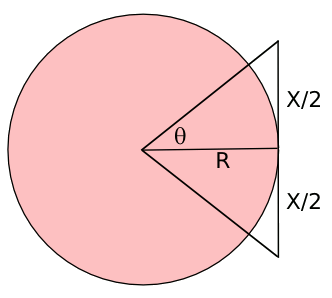
Pi Day
March 14, 2012 Today is "Pi Day" (3.14). I wasn't among the many fans who likely stayed awake until 1:59 AM to get those last extra decimal digits, but I'm still a big fan of the mathematical constant, pi. Pi appears to be an important part of the physical universe, since it appears in so many fundamental equations of physics. For example, the Einstein field equations of general relativity contain the constant (8πG/c4). Pi must have weighed heavily on my mind in 2010, since I wrote three articles about it.• Buffon's Needle, July 19, 2010The last article somehow made it to the fourth page of 43,400 results on Google when I searched for hex digits of pi. It must be a niche area. More on hex digits of pi later in this article. The first accurate estimates of pi were done by Archimedes, who used a geometrical approach of approximating a circle by inscribed and circumscribed polygons (see figure). You can do this for regular polygons of any number of sides, but Archimedes was limited to those with special angles, such as 30 degrees, for which he could calculate the tangent. Today, using trigonometric tables, we can do this for any regular polygon. This doesn't make that much sense, since the trigonometric functions are calculated by series expansions, and so is pi.
• Another Piece of Pi, July 28, 2010
• Pi is Forever, September 23, 2010
 | Principle behind the calculation of pi using a circumscribed polygon. (Rendered by the author using Inkscape). |
π ≈ P/(2R),Archimedes was able to calculate our elementary school value of pi, 22/7, using a circumscribed 96-sided polygon. Ptolomey did the same with a 360-sided polygon, getting the value, 3.141666..., that's correct to three decimal places. Computer techniques have allowed a calculation of pi to 10,000,000,000,050 decimal digits. This was done by Shigeru Kondo, a Japanese systems engineer, on home-built hardware. This is truly overkill. Our present estimate of the diameter of the universe is 93 billion light-years (8.8 x 1026 meters), so we only need twenty-seven digits of pi to calculate the circumference of the universe to better than a meter, and thirty-eight digits to get a value of the circumference closer than the size of an atom. In the past, if you wanted the n-th digit of pi, you needed to calculate all the digits leading up to n. This changed in 1997, when David Bailey, Peter Borwein and Simon Plouffe (BBP) published a formula that allows calculation of any digit of pi without calculation of all the preceding digits.[1-3]
 |
"Somewhere inside the digits of pi is a representation for all of us -- the atomic coordinates of all our atoms, our genetic code, all our thoughts, all our memories. Given this fact, all of us are alive, and hopefully happy, in pi. Pi makes us live forever. We all lead virtual lives in pi. We are immortal."You can try to find parts of yourself in pi, at this web site.[7]
References:
- David H. Bailey, Peter B. Borwein and Simon Plouffe,"On the Rapid Computation of Various Polylogarithmic Constants". Mathematics of Computation, vol. 66, no. 218 (April 1997), pp. 903-913.
- David H. Bailey, "The BBP Algorithm for Pi, September 17, 2006
- Tsz-Wo Sze, "The Two Quadrillionth Bit of Pi is 0! Distributed Computation of Pi with Apache Hadoop," arXiv Preprint Server, August 18, 2010.
- David H. Bailey, "BBP Code Directory" (Updated September 8, 2006)
- Cliff Pickover, "We are in Digits of Pi and Live Forever," May 2003.
- David Whitehouse, "How random is pi?," BBC News, July 23, 2002.
- David G. Andersen, The Pi Searcher Web Site
- David Blatner, Joy of Pi Web Site.
- Eric W. Weisstein, "Pi Digits." From MathWorld--A Wolfram Web Resource.
- David H. Bailey, "The BBP Algorithm for Pi, September 17, 2006